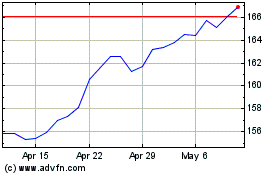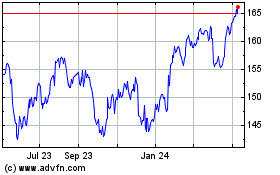By WSJ Staff
Executives world-wide returned to work Wednesday to face a
radically changed political landscape as they weighed the
ramifications of Donald Trump's surprise election -- the second big
shift for global businesses in recent months after the U.K.'s vote
to leave the European Union.
U.S. businesses braced for revamped trade pacts and a potential
crackdown on overseas operations, coupled with the promise of lower
taxes, less regulation and higher infrastructure spending at home.
Executives in Asia and Europe said they were hopeful their close
ties with U.S. economy would endure the political upheaval and
heated campaign rhetoric.
In an open letter Wednesday to the president-elect, a group of
CEOs including the leaders of Boeing Co., Procter & Gamble Co.
and United Technologies Corp. expressed an "urgent need to restore
faith in our vital economic and government institutions."
Mr. Trump had harsh words on the campaign trail about big
companies like Ford Motor Co. and United Technologies for moving
jobs and operations overseas. For example, Mr. Trump promised to
slap 35% tariffs on cars imported to the U.S. from Mexico.
"We are aware that there will be times when we disagree on the
specifics of important policies," the CEOs wrote in a letter
organized by the National Association of Manufacturers, a major
trade group. "We do believe, however, that we can be
constructive... if we can all approach challenging situations in
good faith."
The President-elect has been critical of global trade, the North
American Free Trade Agreement and the Trans-Pacific Partnership, an
agreement to lower or eliminate tariffs between the U.S. and 11
other countries including Japan and Vietnam. He has also been
critical of China, the biggest U.S. trading partner.
"We hope President Trump is more nuanced than candidate Trump,"
said Jake Parker, vice president of China operations of the
U.S.-China Business Council.
Charlie Ergen, CEO of Dish Network Corp., said a Trump
administration could bring bipartisan support for infrastructure
spending, lighter regulation and a "more rational" tax code that
would bring offshore money back into the country. "You've got a lot
of potential positives for business in general," Mr. Ergen
said.
Mr. Trump's election sent waves through the U.S. health-care
industry, providing relief to drugmakers worried about the specter
of government price limits but fanning fears for hospital operators
and some health insurers that the Medicaid expansion in President
Obama's health law could get rolled back. That provision had
brought those companies more paying customers.
Mr. Trump has vowed to repeal the Affordable Care Act, though
many analysts think it is unlikely all of the ACA's effects would
be undone. Mr. Trump also took aim at high drug prices during his
campaign, hinting at measures such as re-importation of drugs and
giving Medicare powers to negotiate drug prices to limit price
rises.
J. Mario Molina, the CEO of Molina HealthCare Inc., a large
insurer of Medicaid patients, expects the new administration to
expand Medicaid further. "Health-care reform is in place, it's
going to be modified, it's going to move forward," he said. "We're
going to see Obamacare 2.0, maybe they will call it Trumpcare, or
Ryancare." He suggested that the law's exchanges might also survive
but change -- perhaps with reduced subsidies and more flexibility
for insurers.
Mr. Trump has promised to spend $1 trillion on infrastructure
projects, a position that was applauded by Caterpillar Inc., which
also relies heavily on export markets. "We've got a lot to do at
home on building our own infrastructure in this country, and we are
excited about some of the things that has said in this regard,"
said Kathryn Dickey Karol, Caterpillar's vice president for global
government and corporate affairs.
But Martin Richenhagen, CEO of farm-equipment maker Agco Corp.,
said he is concerned about Mr. Trump's repeated support for trade
protectionism. "That would be a nightmare if we make life difficult
for imports and exports," said Mr. Richenhagen, who was in Germany
this week. "We need to explain that to him. The Europeans are very
concerned."
Mr. Trump has proposed overhauling U.S. corporate taxes by
reducing the rate to 15% from 35%. His plan also provides for a
one-time tax rate of 10% for repatriated corporate profits, which
would help fund infrastructure projects. About $2.4 trillion in
overseas cash sits on the balance sheets of U.S. corporations,
sheltered from U.S. corporate income taxes because the companies
have declared it unlikely to be used in the U.S.
Mr. Trump said he would instruct the U.S. Trade Representative
to bring trade cases against the Chinese to punish them for
allegedly using unfair subsidies to help their companies. That gave
a boost to shares of U.S. producers like US Steel Corp. but could
spell trouble for everyone from Apple Inc. to Wal-Mart Stores Inc.,
which rely on Chinese factories.
The National Retail Federation is keeping a close eye on how Mr.
Trump might alter cross-border trade, tax policy and labor laws.
"The retail supply chain is a thoroughly global supply chain," said
David French, the group's senior vice president of government
relations. "Anything that threatens two-way trade can hurt retail
and consumers," Mr. French said.
Mr. Trump intentions for the energy industry were clear: put
coal miners back to work, undo subsidies for renewable power and
end U.S. participation in global efforts to stop climate
change.
Scott Sheffield, chief executive of Pioneer Natural Resources
Co., a major U.S. producer in West Texas, said removing onerous
regulations would help put oil employees hit hard by a two-year
energy bust back to work. "His message about creating jobs is why
he broke the blue wall" and attracted votes from Democrats in some
states, Mr. Sheffield said.
Continental Resources Inc. CEO Harold Hamm, Mr. Trump's chief
adviser on energy issues, said subsidies for renewable energy like
solar and wind should be eliminated. "None of it should be
subsidized, none of it," Mr. Hamm said Wednesday in an interview,
the morning after he attended Mr. Trump's victory party. "If it
makes it in the market, fine."
(END) Dow Jones Newswires
November 09, 2016 16:31 ET (21:31 GMT)
Copyright (c) 2016 Dow Jones & Company, Inc.
Procter and Gamble (NYSE:PG)
Historical Stock Chart
From Mar 2024 to Apr 2024

Procter and Gamble (NYSE:PG)
Historical Stock Chart
From Apr 2023 to Apr 2024
